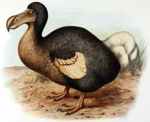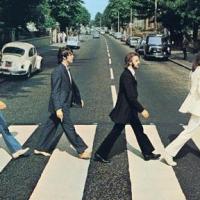Dodo
 The Dodo, an ungainly flightless bird, is extinct. “As dead as a dodo” is a phrase synonymous with finality. Yet in truth it also represents mankind’s ignorance, exploitation, and failure to recognise natural and delicate balances of ecology and habitat.
The Dodo, an ungainly flightless bird, is extinct. “As dead as a dodo” is a phrase synonymous with finality. Yet in truth it also represents mankind’s ignorance, exploitation, and failure to recognise natural and delicate balances of ecology and habitat.
Today we can frown upon those early seafarers who during the course of trade and exploration systematically devastated indigenous wildlife on their travels. The Dodo was just one of many creatures which provided easy meat. Just as the giant tortoises of the Galapagos Islands fell easy prey to hungry jack-tar and matelote – the rough sailors who had suffered long sea journeys with maggot ridden food, and succumbed easily to sickness.
Charles Darwin surmised, through his theory of evolution and natural selection, that species will invariably lose their original design if no predators exist to threaten them.
Hence why does a bird need wings if it doesn’t need to fly? All creatures, having evolved over millions of years, will adapt to their surroundings. If the Dodo felt threatened in its environment, it would not have lost its wings.
The Dodo, endemic to the island of Mauritius in the Indian Ocean, was a bird over three feet tall, and nested on the ground, which is indicative of it’s perceived security. It would never know that a ruthless predator would pounce one day. These predators came as passing seafarers and found easy pickings. Sailors tell tales, and the news of their experiences would soon spread.
Early explorers and colonists would not have considered the long term environmental impact of their enterprise. Nor would they have seen that introducing domesticated animals like cats and pigs to their new found land would have such a detrimental impact.
The Dodo, having never encountered a cat before, would be at a loss to defend itself. Having no wings was a significant drawback. Similarly, livestock required land, and as harmless as a pig may appear, they were much more dominant in foraging than the humble dodo which survived on fruit and lived in harmony with the tambalacoque tree.
Together with rats which were always unwelcome stowaways, and the deforestation of land to clear areas for human habitation, the Dodo’s peaceful and harmless existence was severely under threat.
Maritime exploration is laced with stories about sightings of strange creatures on land or at sea. The dodo was first sighted during the mid 17th Century in Mauritius by Dutch sailors. Back then conservation and protection would have been as remote a concept as satellite navigation.
Whilst modern man may wring his hands and lament about the extinction of a species, everything must be viewed in the historical context of the times. The dodo is dead, but not forgotten. It’s a permanent reminder – a symbol – that man is the custodian of Earth’s flora and fauna. This is the legacy of the Dodo.







